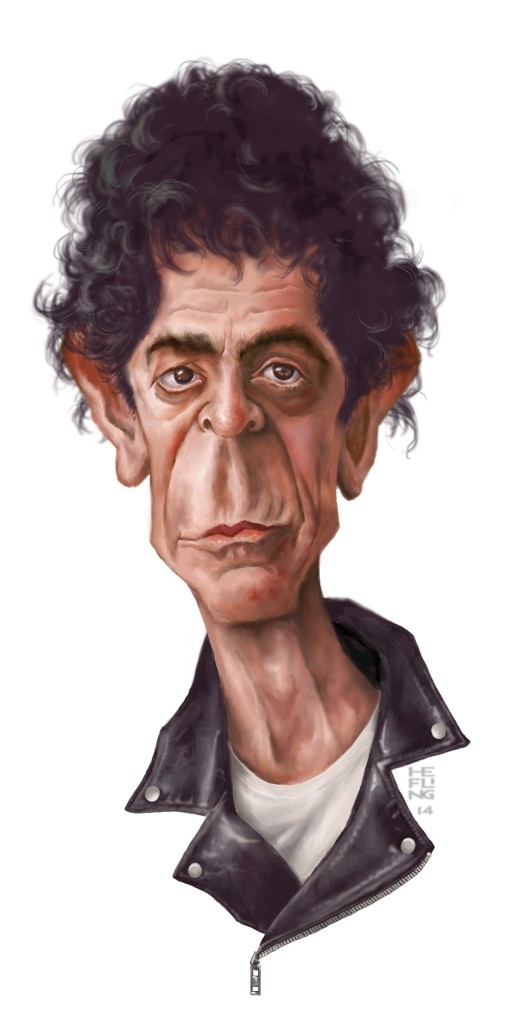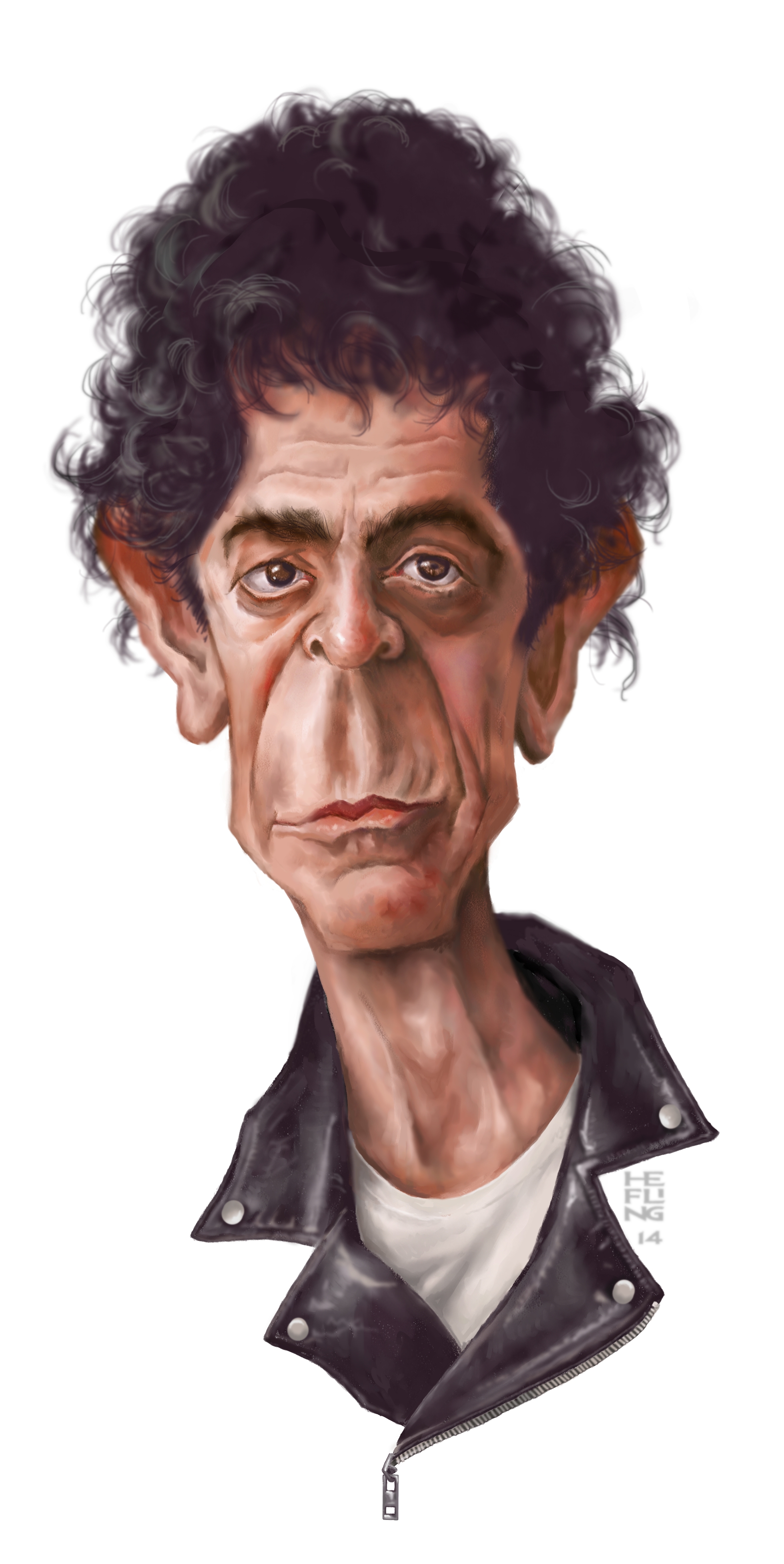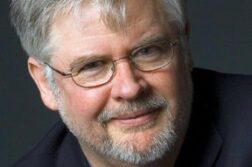HE WAS the “Johnny Cash of New York rock,” said Mick Jagger. He was “pop’s truly great poker face,” said Bono. He was Lou Reed, co-founder of the avant-garde rock band the Velvet Underground and a prodigious solo artist whose career spanned a half-century. If the most famous question in rock ’n’ roll belongs to Dylan—“How does it feel to be on your own, like a rolling stone?”—its most famous imperative belongs to Reed: “Take a walk on the wild side.” And the wild side is where Reed remained, from his early days as the Underground’s vocalist-guitarist to the glam-rock heights of Transformer and over a dozen solo albums. “I’m not big-time,” he once told Rolling Stone, “I’ve always been on the outside.”
“Walk on the Wild Side” (1972) was also Reed’s only Top 20 single. Produced by rock music’s other most famous bisexual, David Bowie, the song drew many of Andy Warhol’s Factory figures into its orbit of oddballs. The cool-cat, beatnik intonations of Reed’s vocals—not to mention that hummable bass line—helped to soften the song’s more explicit references to transsexuals, prostitutes, and oral sex. The “Holly” who “came from Miami, FLA … plucked her eyebrows on the way/ Shaved her legs and then he was a she” was inspired by Holly Woodlawn, a drag queen whose coterie included, as Reed put it, a “very funny group of people” with stage names like
 Candy Darling, Rotten Rita, and Ultra Violet. Warhol himself created the iconic album cover for The Velvet Underground & Nico (1967), which features a phallic banana. The sexy squalor of New York would become a fixation for Reed, and he captured the scene again and again with searing cynicism. “Give me your hungry, your tired, your poor, I’ll piss on ’em,” he sneered on 1989’s “Dirty Blvd.”: “That’s what the Statue of Bigotry says.”
Candy Darling, Rotten Rita, and Ultra Violet. Warhol himself created the iconic album cover for The Velvet Underground & Nico (1967), which features a phallic banana. The sexy squalor of New York would become a fixation for Reed, and he captured the scene again and again with searing cynicism. “Give me your hungry, your tired, your poor, I’ll piss on ’em,” he sneered on 1989’s “Dirty Blvd.”: “That’s what the Statue of Bigotry says.”
Reed was also, in the words of R.E.M.’s Michael Stipe, the “first queer icon of the 21st century.” And while his greatest music truly belongs to the 20th century, his legacy is a queer one indeed. “Walk on the Wild Side” is just one of several gay-positive songs from 1972’s Transformer. On “Andy’s Chest,” he burrows into a beehive of double entendres: “You know what they say about honey bears when you shave off all their baby hair?/ You have a hairy minded pink bare bear.” As a singer, Reed had a limited range, but he knew how to lighten his monotone with R&B harmonies reminiscent of the 1950s. And in “Vicious,” the jangly electric chords are perfectly matched by Reed’s cutting humor: “Why don’t you swallow razor blades?/ You must think I’m some kind of gay blade.” There’s nothing distinctly gay about the epic, ten-minute “Street Hassle,” but like any great song it produces not just a sound but an atmosphere. Small wonder his songs lent themselves to the silver screen, where films like The Squid and the Whale and Trainspotting used them for dramatic effect.
Family life, for Reed, could be as vicious as the streets. He was born Lewis Allan Reed on March 2, 1942. His father was a Brooklyn tax accountant who proved intolerant to his eldest son’s sexual nonconformity. Late in life, Reed told filmmaker Julian Schnabel that his father’s homophobia cut deep. He felt the “cruelty” when, putting his hand near his father’s, Sidney Reed smacked him. The elder Reed later sent his son repeatedly for electroshock treatment at Creedmoor State Psychiatric Hospital in Queens. Memories of his adolescence resulted in the most terrifying song in all his repertoire: “Kill Your Sons” (from 1974’s Sally Can’t Dance). Against a cacophony of crashing guitars, Reed finally raises his voice: “All your two-bit psychiatrists are giving you electroshock/ Don’t you know they’re gonna kill,/ kill your sons until they run away!” Perhaps there’s a way to see, or rather hear, 1975’s Metal Machine Music, a double album of pure guitar feedback, as the aftershocks of that teenage trauma.
His “Halloween Parade” is no less harrowing, and as another loco-description of downtown Manhattan, Reed offers an elegiac glimpse into gay American life (and death) during the AIDS crisis. The song can be found on the aptly titled New York, Reed’s only album that went gold, back in 1989. The speaker hears a “downtown fairy singing out ‘Proud Mary’ as she cruises Christopher Street.” Nearby there’s “some black Jamaican stud,” alongside “five Cinderellas and some leather drags.” But their presence is paradoxically marked by absence—“You won’t hear those voices again”—so when the doo-wop chorus kicks in, “Halloween Parade” becomes a true danse macabre.
Reed made it to seventy, but his health finally faltered in the fall of 2013 when the hepatitis he’d contracted as a drug user worsened. He kept a strict tai chi regimen throughout the final stages of liver disease. He died not far from the city he loved, beside the longtime partner he loved, performance artist Laurie Anderson. She elegized him soon after, saying: “Lou’s jukebox spun for love and many other things, too—beauty, pain, history, courage, mystery.” Ave atque vale.




